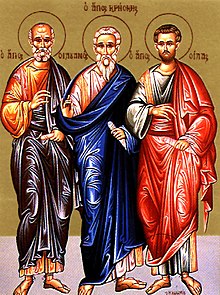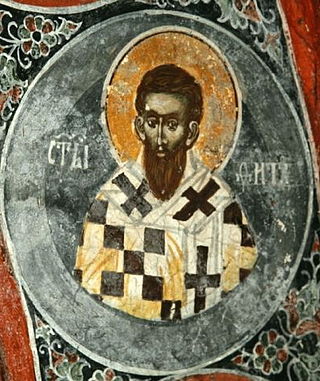
Titus was an early Christian missionary and church leader, a companion and disciple of Paul the Apostle, mentioned in several of the Pauline epistles including the Epistle to Titus. He is believed to be a Gentile converted to Christianity by Paul and, according to tradition, he was consecrated as Bishop of the Island of Crete.
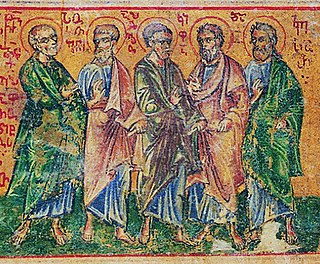
Apollos was a 1st-century Alexandrian Jewish Christian mentioned several times in the New Testament. A contemporary and colleague of Paul the Apostle, he played an important role in the early development of the churches of Ephesus and Corinth.

Barnabas, born Joseph (Ἰωσήφ) or Joses (Ἰωσής), was according to tradition an early Christian, one of the prominent Christian disciples in Jerusalem. According to Acts 4:36, Barnabas was a Cypriot Jew. Named an apostle in Acts 14:14, he and Paul the Apostle undertook missionary journeys together and defended Gentile converts against the Judaizers. They traveled together making more converts, and participated in the Council of Jerusalem. Barnabas and Paul successfully evangelized among the "God-fearing" Gentiles who attended synagogues in various Hellenized cities of Anatolia.

The Epistle to Titus is one of the three pastoral epistles in the New Testament, historically attributed to Paul the Apostle. It is addressed to Saint Titus and describes the requirements and duties of presbyters/bishops.
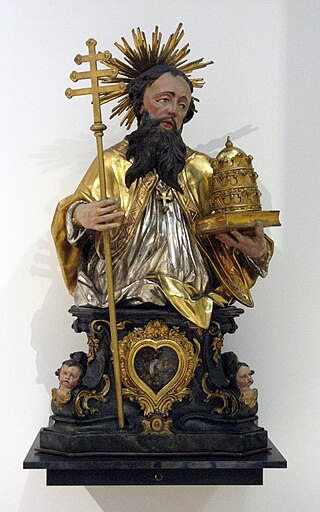
Pope Linus was the bishop of Rome from c. AD 68 to his death. He is generally regarded as the second Bishop of Rome, after St. Peter. As with all the early popes, he was canonized.

Timothy or Timothy of Ephesus was an early Christian evangelist and the first Christian bishop of Ephesus, who tradition relates died around the year AD 97.

Mark the Evangelist, also known as John Mark or Saint Mark, is the person who is traditionally ascribed to be the author of the Gospel of Mark. Modern Bible scholars have concluded that the Gospel of Mark was written by an anonymous author rather than an identifiable historical figure. According to Church tradition, Mark founded the episcopal see of Alexandria, which was one of the five most important sees of early Christianity. His feast day is celebrated on April 25, and his symbol is the winged lion.
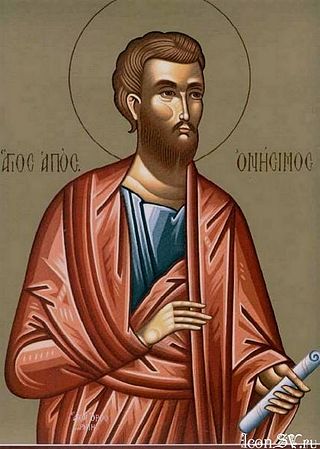
Onesimus, also called Onesimus of Byzantium and The Holy Apostle Onesimus in the Eastern Orthodox Church, was a slave to Philemon of Colossae, a man of Christian faith. He may also be the same Onesimus named by Ignatius of Antioch as bishop in Ephesus which would put Onesimus's death closer to 107. If so, Onesimus went from slave to brother to bishop.
Presbyter is an honorific title for Christian clergy. The word derives from the Greek presbyteros, which means elder or senior, although many in Christian antiquity understood presbyteros to refer to the bishop functioning as overseer. The word presbyter is used many times in the New Testament, referring both to the Jewish leadership and the "tradition of the elders", and to the leaders of the early Christian community.

Silas or Silvanus was a leading member of the Early Christian community, who according to the New Testament accompanied Paul the Apostle on his second missionary journey.

Priscilla and Aquila were a first-century Christian missionary married couple described in the New Testament. Aquila is traditionally listed among the Seventy Disciples. They lived, worked, and traveled with the Apostle Paul, who described them as his "fellow workers in Christ Jesus".

Archippus was an early Christian believer mentioned briefly in the New Testament epistles of Philemon and Colossians.

Saint Quadratus of Athens was a Greek Apostolic Father, bishop of Athens. He is counted among the Seventy Apostles in the tradition of the Eastern Churches.

The seventy disciples, known in the Eastern Christian traditions as the seventy apostles, were early emissaries of Jesus mentioned in the Gospel of Luke. The number of those disciples varies between either 70 or 72 depending on the manuscript.

Tychicus was an Asiatic Christian who, with Trophimus, accompanied the Apostle Paul on a part of his journey from Macedonia to Jerusalem. He is also alluded to have been with Paul in Rome, where the apostle sent him to Ephesus, probably for the purpose of building up and encouraging the church there. In the New Testament, he is mentioned five times.
The Archbishopric of Vienne, named after its episcopal seat in Vienne in the Isère département of southern France, was a metropolitan Roman Catholic archdiocese. It is now part of the Archdiocese of Lyon.
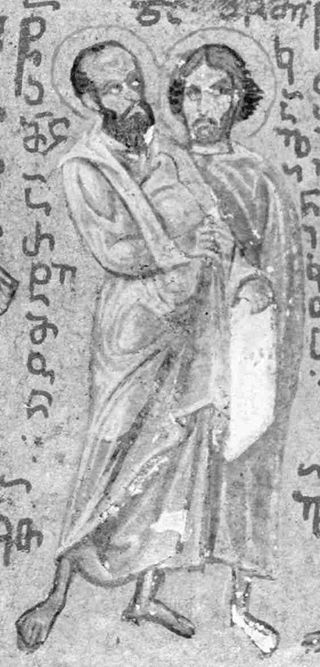
Artemas of Lystra was a early Christian saint, who is mentioned in the New Testament. He is mentioned in Paul's Epistle to Titus. He is believed to have served as the Bishop of Lystra, and to have been one of the Seventy Disciples. He is a saint in the Eastern Orthodox Church and Roman Catholic Church.

Aristarchus or Aristarch, "a Macedonian of Thessalonica", was an early Christian mentioned in a few passages of the New Testament. He accompanied Saint Paul on his journey to Rome. Along with Gaius, another Roman Macedonian, Aristarchus was seized by the mob at Ephesus and taken into the theater. Later, Aristarchus returned with Paul from Greece to Asia. At Caesarea, he embarked with Paul on a ship of Adramyttium bound for Myra in Lycia ; whether he traveled with him from there to Rome is not recorded. Aristarchus is described as Paul's "fellow prisoner" and "fellow laborer" in Colossians 4:10 and Philemon 1:24, respectively.
Zenas the Lawyer was a first-century Christian mentioned in Paul the Apostle's Epistle to Titus in the New Testament. In Titus 3:13, Paul writes: "Bring Zenas the lawyer and Apollos on their journey diligently, that nothing be wanting unto them" (KJV). His name is a shortened form of "Zenodoros", meaning "gift of Zeus". By tradition, he is often counted as one of the unnamed seventy disciples sent out by Jesus into the villages of Galilee, as mentioned in Luke 10:1–24.

The following outline is provided as an overview of and topical guide to Christianity:
